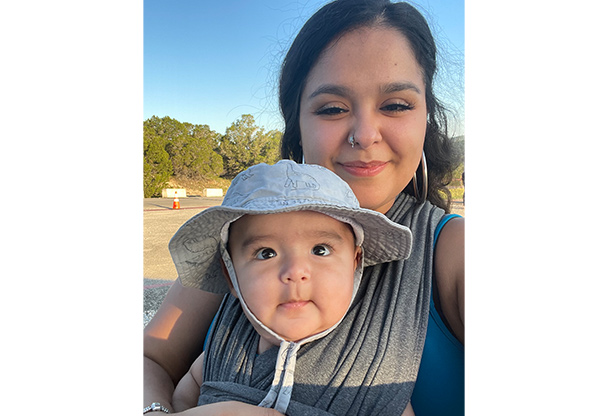Overcoming Esophageal Atresia: Perseus’s NICU Journey at CHRISTUS Children’s
Alyssa Rivas was so excited to become a mother. As her due date approached, she chose to deliver at CHRISTUS Children’s. Little did she know this decision would impact her son’s life in unexpected ways.
Alyssa had a smooth pregnancy and a few common challenges during labor, such as difficulties with dilation and various interventions to induce labor. However, when her son was born, Alyssa immediately started noticing concerning symptoms.
His cries were weak, and despite the nurses’ efforts to clear his airways, he struggled to breathe and seemed to breathe in fluid frequently. Even attempts to feed him a small amount of milk resulted in immediate vomiting and mucus discharge.
“I called the nurses every 30 minutes because he was aspirating,” Alyssa said. "Even when my lactation consultant tried to get him to latch, Perseus could latch but was unable to swallow."
Her son Perseus faced a rare congenital complication called esophageal atresia.
This unexpected diagnosis blindsided Alyssa. Perseus’s condition had gone undetected in prenatal ultrasounds at another clinic.
“I am glad God directed me to CHRISTUS Children’s,” Alyssa adds. “I had other options to choose from, but he directed me here. I couldn’t have gotten through this without them and my family’s support.”
Esophageal Atresia Diagnosis Leads to Surgery Hours After Birth
Dr. Cody Henderson, a neonatologist at CHRISTUS Children's, quickly ordered a chest X-ray to investigate Perseus's breathing difficulties. The X-ray confirmed a devastating diagnosis: esophageal atresia, a rare birth defect where the esophagus is incompletely formed, preventing food from reaching the stomach.
However, Perseus's case was even more complex. The X-ray also revealed a tracheoesophageal fistula, meaning his trachea, or windpipe was abnormally connected to his esophagus. This further hindered his ability to breathe and swallow.
"I was terrified," Alyssa recalls. "This news was completely unexpected and overwhelming."
Dr. Henderson referred Alyssa to Dr. Jonathan Greenfeld, a pediatric surgeon who explained the complex surgery Perseus would need within hours of his birth.
“Despite the urgency and fear of the situation, Dr. Greenfeld’s detailed explanations and willingness to answer all of my questions proved a sense of calm and reassurance as we prepared for my son’s operation,” Alyssa said. “I knew the potential risks going into it, but I felt confident and supported as we moved forward.”
The Surgery
On Jan. 10, 2024, Dr. Katherine Barsness and her team performed surgery on Perseus to treat his tracheal esophageal atresia.
The success rates for esophageal atresia surgery have improved significantly in recent years due to surgical techniques and neonatal care advances. In the United States, survival rates are now above 90 percent. However, outcomes can vary depending on several factors.
During the operation, Dr. Barsness corrected Perseus’s abnormal esophagus-trachea connection by separating the upper esophagus from the trachea and reattaching it properly to allow swallowing and prevent complications.
However, a week later, a complication surfaced, requiring a second surgery.
His doctors and nurses noticed that Perseus was still discharging mucus. His recent surgery did not completely heal, causing a leak in the esophagus.
“The mucus kept coming out of him, even from the chest tube and the OG tube,” Alyssa recalled.
After the second surgery, Perseus didn’t eat for the first three weeks of his life to ensure everything healed properly.
69 Days in the NICU
Perseus received oxygen support in the neonatal intensive care unit, or NICU, and worked with a speech therapist to improve his swallowing. However, his eating remained inconsistent, sometimes taking a full feeding and other times struggling.
To address this issue, Perseus underwent a dilation procedure to widen his esophagus, hoping to improve his swallowing ability. Unfortunately, a follow-up swallow study showed that he was still aspirating. This study uses X-rays to track the movement of liquid and food through the throat and esophagus to assess swallowing.
Concerned about Perseus's lack of progress with oral feeding, Dr. Henderson recommended a G-tube, a feeding tube placed directly into the stomach.
"Dr. Henderson provided me with educational materials and explained the G-tube thoroughly, and the Child Life team showed me how it worked on a doll, which was helpful," Alyssa said. "Knowing that reaching feeding milestones was crucial for Perseus to leave the NICU, I felt confident in this decision."
Perseus’s condition gradually improved during his 69-day stay in the NICU.
During his stay in the NICU, Perseus received care from the neonatology team comprising Dr. Maria Pierce, Dr. Cody Henderson, Dr. Cheryl Matta, and Dr. Pratik Parikh to the compassionate nurses, child life specialists, lactation specialists, and speech pathologists.
“I would never have my baby anywhere else but at CHRISTUS Children’s,” said Alyssa. “Every doctor, surgeon, nurse, and every person who came in contact with me, from the custodian to those bringing me food, were amazing.”
Perseus Today
Today, 4-month-old Perseus is doing remarkably well. He loves to giggle, smile, and sleep. Although he continues to eat with a G-tube, he will eventually eat by mouth. He has regular checkups with his pediatrician, Dr. Lisa Vargas.
Alyssa calls Perseus her “adventure baby.” He loves the beach and going on fun outings.
As challenging as being a single mom can be, she says, “Perseus and I are truly blessed."
Learn more about CHRISTUS Children's NICU.



